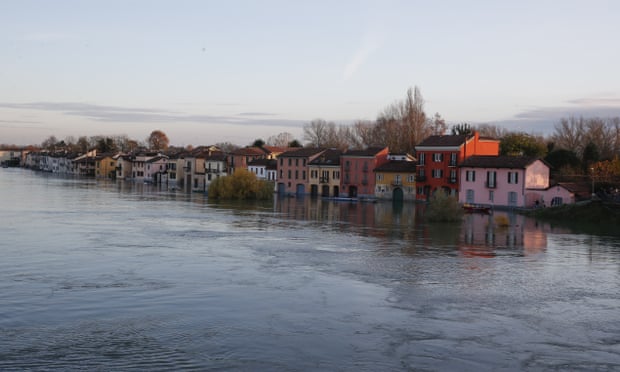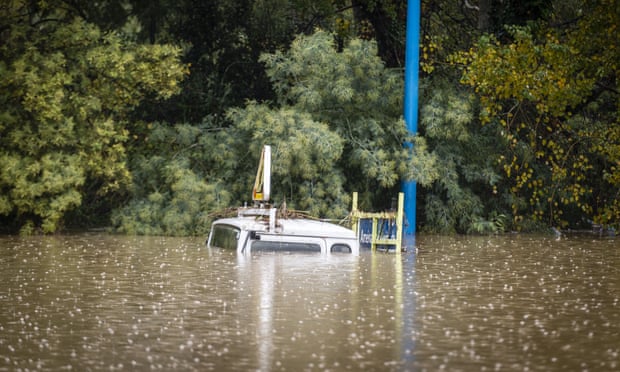Nine people die as weekend of heavy rain brings landslides, floods and collapsed overpass
Nine people have died as violent storms swept through parts of France, Greece and Italy over the weekend, causing flash floods, landslides and the collapse of an overpass.
Greek media described the storms as leaving a trail of “biblical destruction” in some areas of the country while the overpass collapse in northern Italy brought back a chilling reminder of Genoa’s Morandi bridge giving way during a thunderstorm in August 2018, killing 43 people.
Flash floods in France’s Côte d’Azur claimed the lives of four people, while two others are believed to still be missing. Three of the victims were found in cars that were swept away in floods in the Var region, and the fourth was among a group being rescued by the fire brigade when the dinghy carrying them to safety capsized.

One of the worst affected towns was Roquebrune-sur-Argens in the Var, where the Argens River rose seven metres. The French meteorological office said three months’ worth of rain had fallen in less than 48 hours.
Members of the French civil defence took part in rescue operations in a number of flooded areas around Cannes and other coastal towns.
The orange alert was lifted in the Var and Alpes-Maritimes regions on Monday as the water receded, leaving an estimated 4,500 homes without electricity. Two other French departments, the Puy-de-Dôme and the Gironde, were placed on high flooding alert.

Jean-Luc Videlaine, the prefect for the Var region, said the rain had been of “historic” intensity and there was considerable damage.
Jean-Pierre Hameau of Météo France said the storms and flooding should not be blamed on climate change. Hameau said the phenomena, known in France as cévenols, or Mediterraneans, were relatively frequent in the region.
“They occur three or six times a year. It often begins in September when the Mediterranean is warm and there is rising hot air in the south,” Hameau said.
“This usually happens in September and October, but sometimes we find these conditions in November. It’s not linked to global warming. We had these cévenols before and there hasn’t been an increase since temperatures rose. However, we have noted an increase in the intensity of the rains.”

Meanwhile in Greece, two men in their 50s died when their sailing boat broke free of its moorings and capsized after being hit by gale-force winds in Antirio.
At least one other person was reported missing in Kineta, a beach town west of Athens that was described as being the worst hit by the storms. Emergency services said it could take days to clear the extensive damage in Kineta, where uprooted trees and rockfalls from surrounding hills also disrupted the road network.
Late on Monday Greece’s public broadcaster said the extreme weather had claimed another two lives on the island of Rhodes. A disabled and elderly woman died when rainwater flooded her home, and a winter swimmer perished at sea.
The fallout from heavy rainfall was such that authorities were forced to close the highway connecting the Greek capital with Corinth and the Peloponnese peninsula as services cleared the road network of tonnes of mud.

The fire service reported widespread flooding of homes, saying hours after the downpours it was still trying to remove people trapped in buildings engulfed by water and debris. The country was bracing itself for more heavy rain later on Monday.
In Italy, a woman died after her car was swept away by the flood of the Bormida River in the north of the country. There was flooding in Turin, landslides in the Liguria region and Lake Como overflowed on Sunday, while the River Ticino burst its banks overnight in the northern city of Pavia. Venice, which has suffered recurrent flooding in recent weeks, was again hit with acqua alta, or high water. The Emilia-Romagna region was on high alert for extreme weather on Monday.
Italy’s prime minister, Giuseppe Conte, said the government had earmarked €11bn of investments intended to accelerate projects to protect the country from extreme weather events.

